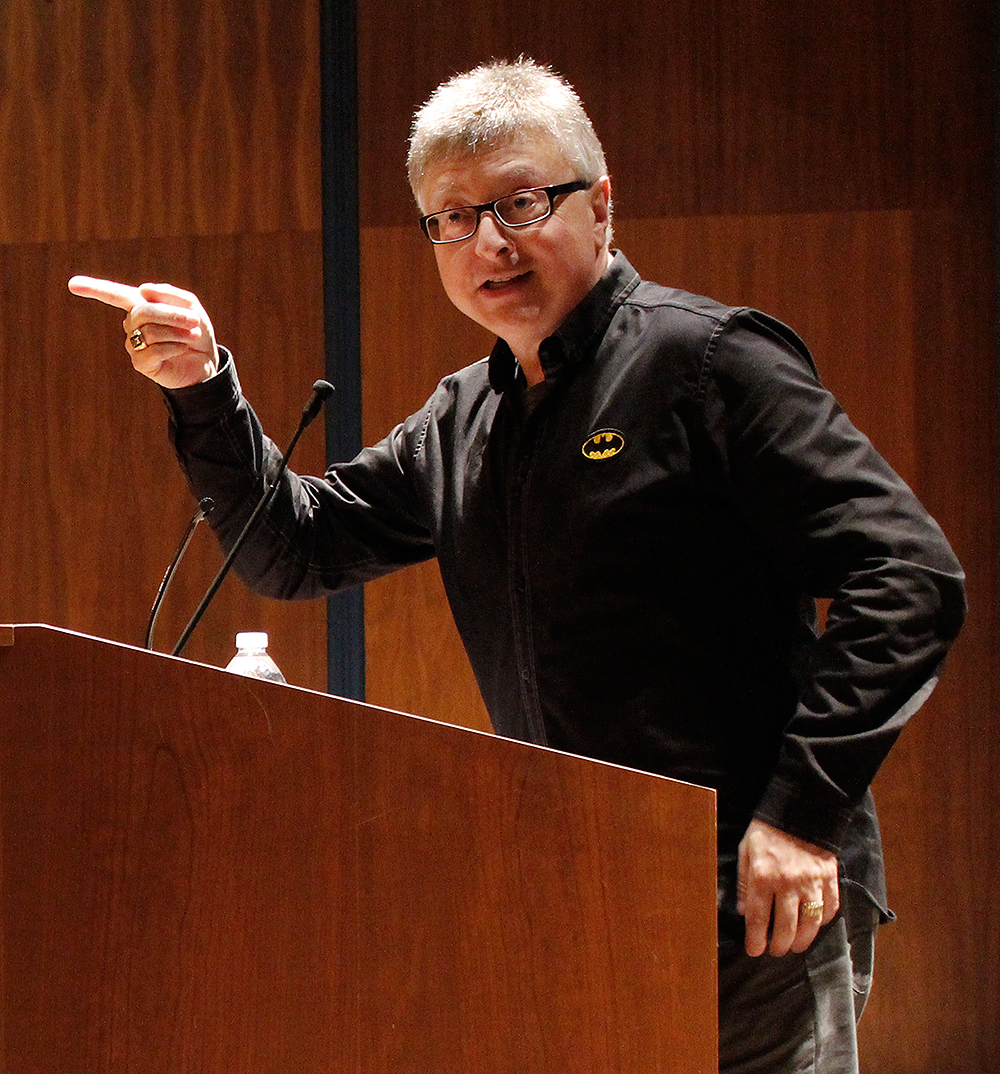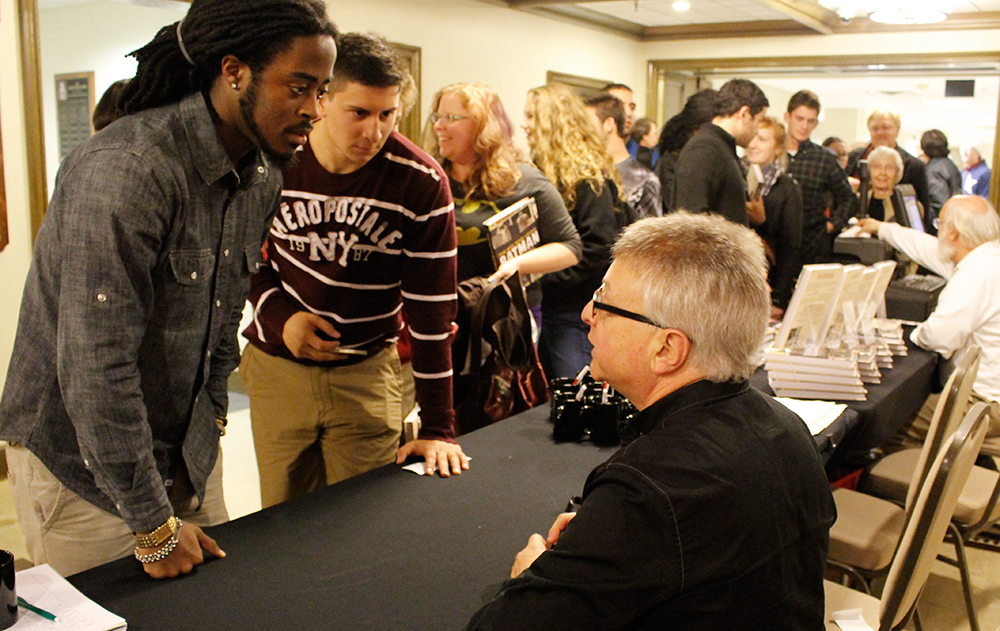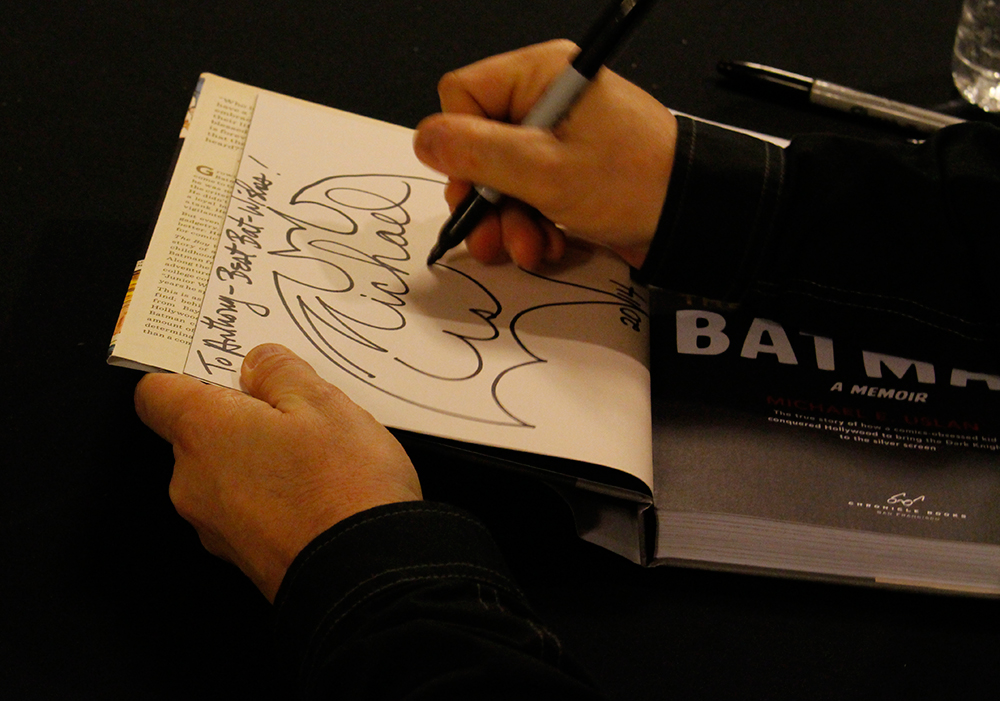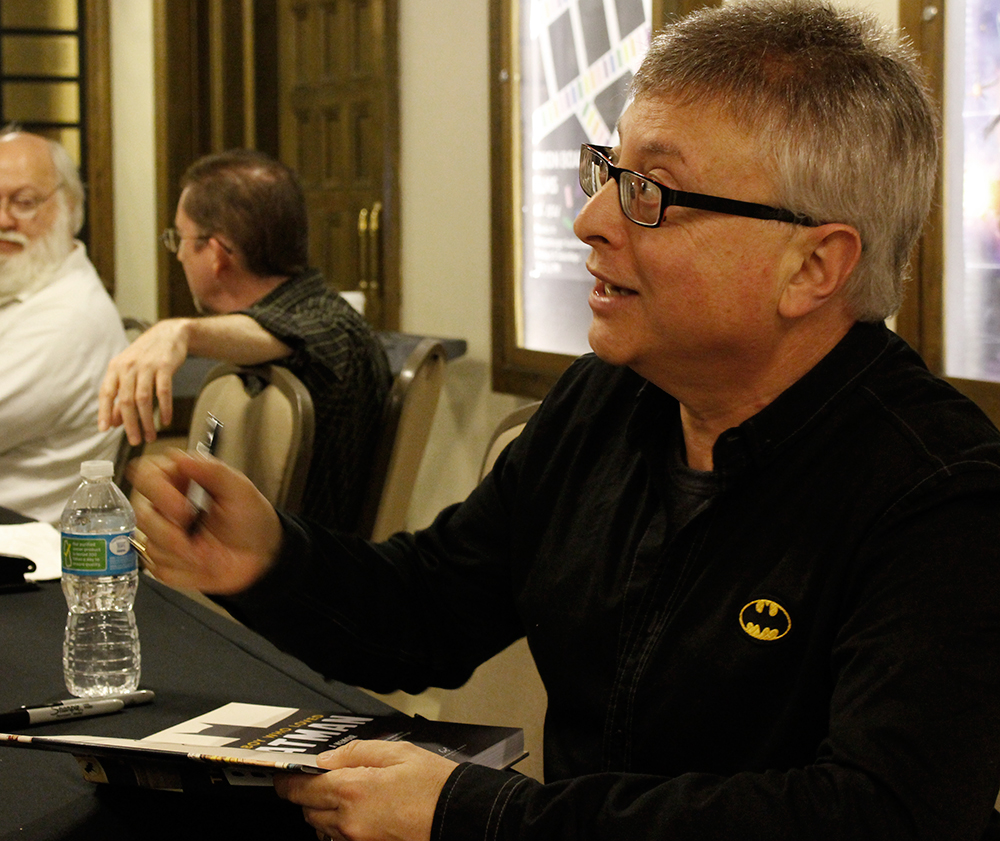Meet Professor Uslan: Newest faculty member talks to students

New Media School professor of practice Michael Uslan was effusive when he spoke to students Thursday evening at Whittenberger Auditorium.
“Oh Toto, we’re home, we’re home,” the IU alumnus said of being back in Bloomington, this time as a faculty member.
Michael Uslan talks while sitting at a table.
Why am I giving IU now however many tens of thousands of comic books and eventually, you’re going to have all my files, memorabilia, artwork, posters, whatever I’ve got is payback. Because it was IU that gave me the opportunity that sent me on the path to accomplish everything I wanted to do, which, if you want to boil it down, which was make my passion my life. And that’s what I’ve done.
But the tag line from The Wizard of Oz was a bit of a misfit for the Hollywood producer famous for reviving Batman on film. He did show his affinity for the caped crusader with his shirt, as did many in the crowd.
“To demonstrate my level of geekiness,” Uslan said, stepping away from the podium and showing off his ankles, “I’m wearing Batman socks.”
He’s not just a Batman geek. He’s the father of the modern-day film Batman, first with the release of director Tim Burton’s Batman in 1989. He was the executive producer of the next three films released by Burton as well as the trilogy directed by Christopher Nolan.
At The Media School, Uslan will teach advanced filmmaking, drawing on his professional expertise. He described to the crowd his adventures from IU student to Hollywood producer.
His first love was comic books.
“My mom said that I learned to read by the age of four from comic books,” Uslan said.
His collection filled the garage of his New Jersey home, where his father was a stonemason and his mother was a bookkeeper.
“My dad never managed to fit the car in the garage,” Uslan said.
Over the years, his collection expanded to more than 45,000 comics. He donated his entire collection to the IU Lilly Library in 2001, one of many interactions with his alma mater over the years.
Uslan’s dream from an early age was to write Batman comics, but he didn’t know how to get into the industry. He chose IU in 1969 because his brother had been to Bloomington liked it. Uslan fell in love with the campus and with the woman he would eventually marry.
He also took the first step toward his career. IU offered an experimental curriculum program in the 1960s and ’70s that allowed any student to propose a class with backing from a professor.
“I wanted to make the first accredited college course on comic books,” Uslan said.
The folklore department supported his idea, largely due to Uslan’s argument that modern-day comic book heroes are culturally linked to ancient heroes of Greece and Rome, he said.

“Comic book super heroes are our modern day mythology,” Uslan said. “Hermes and Mercury are like the Flash. Poseidon and Neptune are like Aquaman.”
With a stack of Superman comics under his arm and his hair down to his shoulders, he proposed his idea to a panel at the College of Arts and Science. Uslan said the dean initially rejected Uslan’s “funny pages,” but Uslan drew similarities between the origins of Moses and of Superman. He said the dean changed his mind.
Uslan remembered that his mother always said he would have to sell himself, so he called United Press International pretending to be a citizen outraged by the creation of a comic book course. The reporter tracked him down, and the story exploded.
“My phone started ringing and never stopped,” Uslan said. “I never taught one class that wasn’t full of reporters and cameras.”
It was enough to attract the attention of Stan Lee, the creator of Marvel comics.
“That was my burning bush moment,” Uslan said.
But it was Julius Schwartz, the then-editor of DC Comics, who contacted Uslan and flew him to New York City. The company offered him a job over the summer writing comics, all while he was still an undergraduate. He started writing Batman a short time after.
His next dream was Hollywood. By this time, Uslan had a bachelor’s degree in history and a master’s degree in education, but he decided to earn a law degree at IU in order to work in the business side of the industry. He was prepared, then, when the chance came along to acquire the movie rights to Batman in 1979.
It wasn’t hard, because “no one else on the planet Earth wanted it,” Uslan said. The campy Batman television show of the 1960s had damaged the public perception of Batman. Uslan wanted to reinvent Batman as the “dark, serious character that he really is,” he said.
He tried pitching Batman to the studio heads in Hollywood, but none thought a superhero movie would succeed.
“It was 10 years of everyone telling me I’m nuts,” Uslan said, “and I asked myself, ‘is everyone right and am I stubborn, or am I right?’ I was sure I was right.”

In 1989, he and Tim Burton created the first dark, serious Gotham. Batman, produced on a budget of $48 million, earned $400 million at the box office, and it was the fifth-highest grossing film of all time when it was released.
The movie spawned an “explosion” of the comic book and comic book film industry, Uslan said. Heroes from both Marvel and DC have earned billions in film sales. And according to an estimate by Comichron, a comic book research organization, comic book and graphic novel sales have increased by $605 million since 2000.
Uslan’s dream of a solemn crusader of the night was fully realized with Christopher Nolan’s Batman Begins, The Dark Knight and The Dark Knight Rises. Nolan’s universe depicted “the struggle between order and chaos,” Uslan said.
Uslan said he was drawn to the idea of being a professor of practice because he wants to be a mentor for students, but also because he wants them to contribute to an industry that needs creative writers and daring executives.
“People tend to forget that it’s all based on great stories,” Uslan said. “You have to have interesting, textured characters that people are interested in and care about.”
“Consider a screenplay to be the equivalent in the building industry of a set of blue prints,” Uslan went on. “So if you’re building a skyscraper and you’ve got the best electrician, the best mason, the best plumber, the best carpenter and you have the best materials, but you have a faulty set of blueprints, your skyscraper is going to fall down.”

Instead of making new blueprints for movies, Uslan said he thinks executives “live in fear, afraid of being second guessed.” It’s easier in Hollywood to remake a movie than to try something new.
“If we can train people to concentrate on story and character, that’ll never go out of style,” Uslan said. “I don’t care how the technology changes. I don’t care how the delivery system changes. There will be people who want to see quality, great stories.”
As for his future students, Uslan said he identifies with them.
“I want them to understand my story, and I’m here because I was literally sitting in the same chairs as they were,” Uslan said. “I was not born with a silver spoon in my mouth. If I could make it happen — and I did — they can.”
This echoed Uslan’s 2006 commencement address, which was hailed by several organizations as one of the top addresses during that graduation season. Then, he told new graduates, “you must have a high threshold for frustration. Take it from the guy who was turned down by every studio in Hollywood. You must knock on doors until your knuckles bleed. Doors will slam in your face. You must pick yourself up, dust yourself off, and knock again. It’s the only way to achieve your goals in life.”
Audience members told Uslan how important that message was for them after the lecture. He signed copies of his book, The Boy who Loved Batman, and spoke to everyone in line.
Jesse Pasternack, a freshman involved with the IU Student Cinema Guild, spoke with Uslan, and said that Uslan’s message to “keep at it, to keep pursuing dreams, and to take control and get off the couch were really inspiring.”

